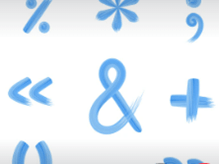
The hyphen joins words or parts of words. Hyphens are used at the ends of lines where a word has been split, to warn the reader that the word continues on the next line. If the word you need to split is clearly made up of two or more smaller words or elements, you should put the hyphen after the first of these parts. Otherwise, you put the hyphen at the end of a syllable.
It is best not to add a hyphen if the word is a short one, or if it would mean writing just one or two letters at the end or beginning of a line. For example, it would be better to write ‘unnatural’ on the line below, rather than writing ‘un-’ on one line and ‘natural’ on the next.
Prefixes that are used in front of a word beginning with a capital letter always have a hyphen after them.
a wave of anti–British feeling
a neo–Byzantine cathedral
A hyphen is used to join two or more words that together form an adjective, where this adjective is used before the noun it describes.
an up–to–date account
a last–minute rush
a six–year–old boy
The hyphen is omitted when the adjective so formed comes after the noun or pronoun it describes.
The accounts are up to date.
It was all rather last minute.
He’s six years old.
Some common compound nouns are usually written with hyphens.
mother-in-law
great-grandmother
Hyphens can be used to split words that have been formed by adding a prefix to another word, especially to avoid an awkward combination of letters or confusion with another word.
re–elect
re–covering furniture
re–creation
For further information on English Grammar, visit: https://grammar.collinsdictionary.com/easy-learning
Come back for other blogs on using English in everyday situations:
https://blog.collinsdictionary.com/language-learners/learning-english



